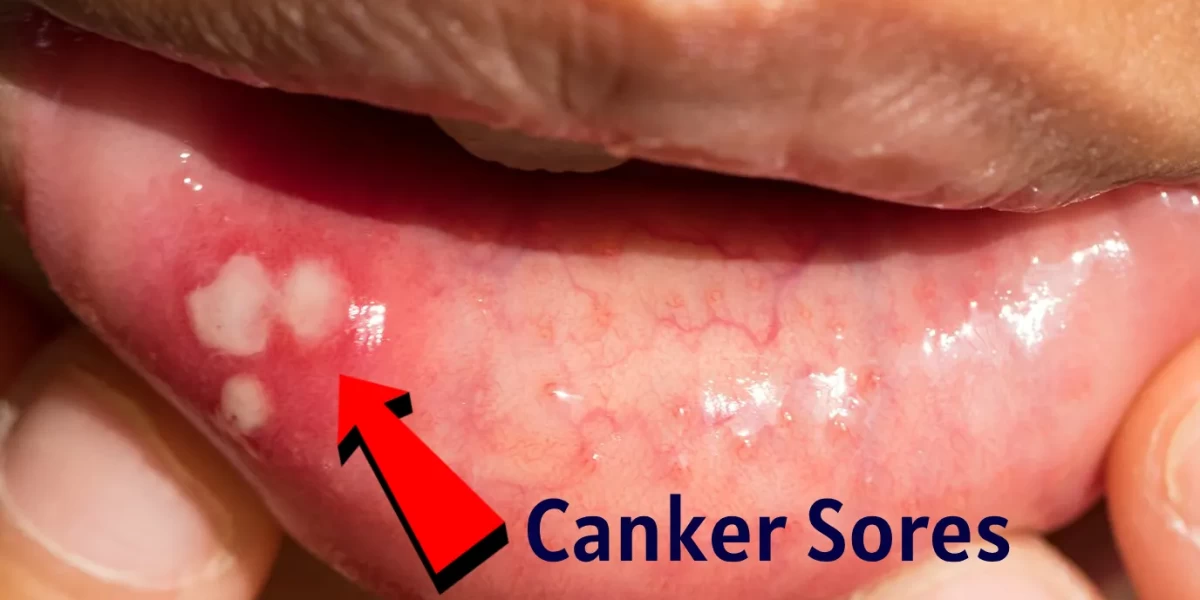Canker sores are one of those pesky little nuisances that almost everyone experiences at some point in their lives. If you’ve ever had a small, painful ulcer inside your mouth, you’ve likely encountered a canker sore. But what exactly are they, why do they happen, and how can you deal with them? In this article, we’ll dive deep into the world of canker sores, exploring their causes, symptoms, diagnosis, treatment, and prevention. By the end, you’ll have a clear understanding of this common oral issue and how to manage it effectively.
What Are Canker Sores?
Canker sores, referred to as aphthous ulcers, are tiny, superficial sores that form on the delicate tissues inside the mouth. In contrast to cold sores, which emerge on the lips and stem from the herpes virus, canker sores do not spread from person to person. They typically form on the inside of your cheeks, lips, under the tongue, or at the base of your gums. These sores can be incredibly uncomfortable, making eating, drinking, and even talking a challenge.
Canker sores typically appear as circular or oval-shaped lesions, featuring a pale or yellowish core surrounded by a reddish edge. They can appear as a single sore or in clusters. While they’re generally harmless and heal on their own within one to two weeks, they can be a recurring problem for some people.
Causes of Canker Sores
The exact causes of canker sores aren’t always clear, but several factors are known to contribute to their development. Here are some of the most common triggers:
-
Minor Mouth Injuries: Accidental bites, aggressive brushing, dental work, or even eating sharp foods like chips can damage the delicate tissues in your mouth, leading to a canker sore.
-
Food Sensitivities: Certain acidic or spicy foods, such as citrus fruits, tomatoes, chocolate, and coffee, can irritate the mouth and trigger sores in some individuals.
-
Nutritional Deficiencies: A lack of essential vitamins and minerals, particularly vitamin B12, zinc, folate, and iron, has been linked to canker sores.
-
Stress and Hormonal Changes: Emotional stress and hormonal fluctuations, especially in women during menstruation, can increase the likelihood of developing canker sores.
-
Underlying Health Conditions: Conditions like celiac disease, Crohn’s disease, and autoimmune disorders can make you more prone to canker sores.
-
Weakened Immune System: A compromised immune system, whether due to illness or medication, can make it easier for canker sores to form.
-
Toothpaste and Mouthwash: Some people find that sodium lauryl sulfate (SLS), a common ingredient in oral care products, irritates their mouth and leads to sores.
Symptoms of Canker Sores
Recognizing the symptoms of canker sores is relatively straightforward. Here’s what to look out for:
-
Painful Ulcers: The most obvious symptom is a small, round sore inside your mouth that’s tender to the touch.
-
Burning or Tingling Sensation: Before the sore appears, you might feel a tingling or burning sensation in the affected area.
-
Difficulty Eating or Drinking: The pain can make it hard to enjoy meals, especially if the sore is in a spot that rubs against your teeth or food.
-
Swollen Lymph Nodes: In some cases, particularly with larger or more severe sores, you might notice swollen lymph nodes.
Canker sores are typically categorized into three types:
-
Minor Canker Sores: Small and oval-shaped, these heal within 1–2 weeks without scarring.
-
Major Canker Sores: Larger and deeper, these can take up to six weeks to heal and may leave scars.
-
Herpetiform Canker Sores: These appear as clusters of tiny sores and can be quite painful, despite their small size.
Diagnosis of Canker Sores
In most cases, you don’t need a doctor to diagnose a canker sore. You can usually identify it based on its appearance and location. However, if you experience any of the following, it’s a good idea to seek medical advice:
-
Sores that are unusually large or persistent (lasting more than two weeks).
-
Sores that spread or worsen over time.
-
Severe pain that doesn’t improve with over-the-counter treatments.
-
Difficulty drinking enough fluids due to pain.
A healthcare provider or dentist can confirm the diagnosis by examining the sore. In rare cases, they might order blood tests or a biopsy to rule out other conditions, such as oral cancer or infections.
Treatment for Canker Sores
While canker sores often heal on their own, there are several treatment options to help ease the pain and speed up recovery:
-
Over-the-Counter Products: Gels, creams, and mouthwashes containing ingredients like benzocaine or hydrogen peroxide can numb the area and promote healing.
-
Prescription Medications: For severe or recurrent sores, your doctor might prescribe stronger topical treatments, corticosteroids, or oral medications.
-
Home Remedies: Rinsing your mouth with salt water or a baking soda solution can help reduce inflammation and discomfort.
-
Avoiding Irritants: Steer clear of spicy, acidic, or crunchy foods that could aggravate the sore.
-
Nutritional Supplements: If a deficiency is suspected, taking supplements like vitamin B12, zinc, or iron might help prevent future sores.
Prevention of Canker Sores
If you’re prone to canker sores, there are steps you can take to reduce their frequency and severity. Here are some effective prevention strategies:
-
Maintain Good Oral Hygiene: Maintain a consistent routine of brushing and flossing to ensure your mouth stays fresh and free from potential irritants.
-
Choose the Right Oral Care Products: Opt for toothpaste and mouthwash that don’t contain sodium lauryl sulfate (SLS).
-
Watch Your Diet: Avoid foods that trigger sores, and ensure you’re getting enough essential nutrients.
-
Manage Stress: Engage in relaxation methods such as mindfulness, yoga, or controlled breathing practices to alleviate stress.
-
Protect Your Mouth: Be mindful of activities that could injure your mouth, such as chewing on hard objects or eating sharp foods.
-
Stay Hydrated: Drinking plenty of water helps keep your mouth moist and less prone to irritation.
Conclusion
Canker sores may be small, but they can pack a punch when it comes to discomfort. Understanding what are canker sores, their causes, symptoms, diagnosis, treatment, and prevention can empower you to manage them effectively. While they’re usually nothing to worry about, persistent or severe sores should be evaluated by a healthcare professional. By taking proactive steps to care for your oral health and avoiding known triggers, you can reduce the likelihood of these pesky sores disrupting your life. So the next time you feel that familiar tingling sensation, you’ll know exactly what to do!
FAQ's
1. What is the cause and treatment of canker sores?
Cause:
Canker sores (aphthous ulcers) are small, painful lesions that develop inside the mouth. Their exact cause is unclear, but contributing factors include:
-
Minor mouth injuries (e.g., from brushing, braces, or biting).
-
Stress or hormonal changes.
-
Food sensitivities (e.g., acidic or spicy foods).
-
Vitamin deficiencies (e.g., B-12, iron, folate).
-
Immune system issues or underlying health conditions.
Treatment:
-
Over-the-counter topical treatments (e.g., gels or ointments with benzocaine or hydrocortisone).
-
Mouth rinses with antimicrobial or anti-inflammatory properties.
-
Avoiding spicy, acidic, or rough foods.
-
In severe cases, prescription medications like corticosteroids or antibiotics may be needed.
2. What is the prevention of canker sores?
-
Maintain good oral hygiene (brush and floss regularly).
-
Avoid foods that trigger sores (e.g., acidic, spicy, or crunchy foods).
-
Manage stress through relaxation techniques.
-
Ensure a balanced diet rich in vitamins and minerals (e.g., B-12, iron, folate).
-
Protect your mouth from injuries (e.g., use a soft-bristled toothbrush).
3. What is the prevention of canker disease?
Canker disease in plants is caused by fungal or bacterial infections. Prevention includes:
-
Pruning infected branches and disposing of them properly.
-
Avoiding wounds to trees or plants during gardening.
-
Applying fungicides or bactericides as needed.
-
Ensuring proper plant nutrition and watering practices.
4. Who can diagnose canker sores?
-
Dentists or doctors (e.g., general practitioners or ENT specialists) can diagnose canker sores based on a visual examination of the mouth.
-
If sores are persistent or severe, further tests may be recommended to rule out underlying conditions.
5. How are mouth sores diagnosed?
-
A visual examination by a healthcare professional.
-
Review of medical history and symptoms.
-
In rare cases, a biopsy or blood test may be done to rule out other conditions (e.g., infections, autoimmune diseases).
6. What deficiency causes canker sores?
-
Vitamin B-12, iron, and folate deficiencies are commonly linked to canker sores.
-
A lack of these nutrients can affect the health of the mucous membranes in the mouth.
7. What is the best treatment for mouth ulcers?
-
Topical treatments (e.g., numbing gels or anti-inflammatory rinses).
-
Avoiding irritants like spicy or acidic foods.
-
Maintaining good oral hygiene.
-
For recurrent ulcers, addressing underlying causes (e.g., vitamin deficiencies or stress).
8. What vitamins prevent cankers?
-
Vitamin B-12: Supports healthy mucous membranes.
-
Folate (Vitamin B-9): Helps with cell repair and growth.
-
Iron: Prevents anemia, which can contribute to mouth sores.
-
Zinc: Supports immune function and wound healing.
9. Which foods are rich in B-12?
-
Animal products: Meat, fish, poultry, eggs, and dairy.
-
Fortified foods: Some cereals, plant-based milks, and nutritional yeast.
-
Supplements: B-12 supplements or multivitamins for those with dietary restrictions (e.g., vegans).












